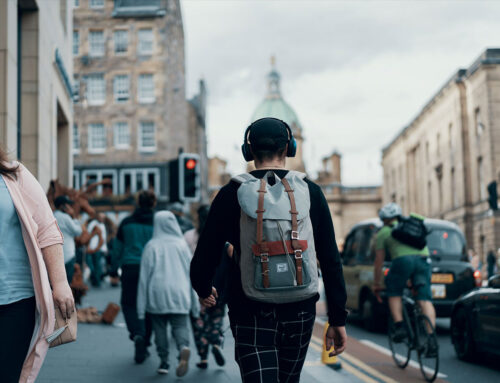Before we get started, we first need to consider what is anxiety.
What is anxiety?
Anxiety is a natural and often healthy emotion characterised by feelings of tension, worried thoughts, and physical changes like increased blood pressure. It serves as a mechanism to alert us to threats, allowing us to anticipate and respond appropriately. However, anxiety can affect daily tasks, routines, and other aspects of life when it becomes excessive, persistent, or out of proportion to the actual threat.
The prevalence of anxiety disorders
Anxiety disorders are among the most common mental health disorders worldwide. They affect Millions of people, making it a significant public health concern. These disorders can vary in intensity and duration and can be triggered by various factors, including genetics, brain chemistry, personality, and life events.
The line between feeling anxious and having an anxiety disorder
While everyone feels anxious from time to time, perhaps before a presentation or in uncertain situations, an anxiety disorder is different. It is characterised by chronic, excessive, and often irrational worry about everyday situations. This chronic nature and the degree of dysfunction it causes in a person’s life differentiate occasional feelings of anxiety from an anxiety disorder.
Common symptoms of anxiety:
- Physical symptoms: These can include palpitations, sweaty palms, shaking, gastrointestinal issues, dizziness, shortness of breath, and muscle tension.
- Feelings of unease: Constantly feeling on edge, restless, or irritable.
- Fear: Intense, excessive, and persistent dread and avoidance of situations that might trigger anxiety, such as social situations or specific phobias.
Common Triggers of Anxiety
Identifying triggers
Every individual might have unique triggers that can induce feelings of anxiety. For some, social situations where they feel observed or judged might be the primary cause, leading to what’s known as social anxiety. For others, specific fears or phobias, such as heights, flying, or certain animals, can be the trigger. Personal worries like financial concerns, health issues, or relationship problems can also lead to heightened anxiety. Recognising and understanding one’s triggers is the first step to managing and potentially reducing the impact of anxiety on one’s life.
The role of stress in exacerbating anxiety symptoms
Stress is a significant catalyst for anxiety. Whether it’s job-related stress, academic pressures, or personal life strains, such situations can act as a breeding ground for anxious feelings. Chronic stress can alter brain structure and function, making the brain more susceptible to anxiety disorders. Moreover, when the body is under stress, it releases the hormone cortisol, which, in high and prolonged amounts, can increase the severity and frequency of anxiety symptoms.
How recreational drugs, alcohol, and lack of sleep can make anxiety worse
- Recreational drugs: Substances like caffeine, nicotine, and certain medications can elevate anxiety levels. Stimulant drugs, including those used recreationally, can increase feelings of restlessness and nervousness.
- Alcohol: While some might use alcohol to cope with anxiety, it can have a paradoxical effect. Initially, it may reduce symptoms, but over time, excessive alcohol consumption can increase susceptibility to anxiety and can exacerbate existing symptoms.
- Lack of sleep: Sleep is essential for cognitive function and emotional regulation. Sleep deprivation can lead to heightened stress reactions, reduced coping mechanisms, and can intensify feelings of anxiety.
Understanding these common triggers is imperative to developing strategies to avoid or cope with them, helping reduce anxiety’s overall impact on one’s life.
Managing Anxiety: Practical Tips and Coping Strategies
Breathing exercises
The importance of focused breathing in managing anxious feelings. Proper and controlled breathing techniques can be a powerful tool in calming the mind and body during anxious episodes. When anxiety strikes, our breathing can become rapid and shallow, exacerbating the feelings of panic. Engaging in deep, rhythmic breathing can counteract this by:
- Slowing the heart rate: Deep breaths allow for better oxygen circulation, which helps to calm the heart rate.
- Distracting the mind: Focusing on the breath can act as a form of meditation, diverting the mind from anxiety-inducing thoughts.
- Releasing tension: Deep breathing helps relax the muscles, reducing physical symptoms of anxiety. Popular breathing exercises include the “4-7-8” technique, diaphragmatic breathing, and box breathing.
Staying active
How physical activity can help cope with anxiety. Physical activity is a natural anxiety reliever. Here’s how it helps:
- Endorphin release: Exercise releases endorphins, the body’s natural painkillers and mood elevators.
- Distracts the mind: Engaging in physical activity provides a break from daily worries and can be a form of moving meditation.
- Improves sleep: Regular physical activity can help regulate sleep patterns, further reducing anxiety.
- Boosts self-confidence: Meeting exercise goals and improving physical health can enhance self-esteem, reducing feelings of anxiety. It doesn’t require intense workouts; even daily walks or gentle yoga can make a significant difference.
The power of the present moment
Strategies to stay grounded and avoid getting lost in anxious thoughts. Being present, or “mindfulness,” is a mental state that focuses on the current moment, accepting and without judgment. Here’s how it can aid in managing anxiety:
- Redirects focus: Mindfulness pulls one’s attention away from anxiety-inducing future scenarios or past regrets, centring it on the present.
- Encourages gratitude: Focusing on the present moment allows one to appreciate life’s small joys, reducing overwhelming feelings.
- Strategies to cultivate mindfulness:
- Mindful meditation: Regularly practising meditation can train the brain to remain present.
- Grounding exercises: Techniques such as the “5-4-3-2-1” method, where one identifies five things they can see, four they can touch, three they can hear, two they can smell, and one they can taste, can quickly bring attention back to the present.
- Routine mindfulness: Incorporate mindfulness into daily routines, like during meals or while walking.
Lifestyle Changes to Support Anxiety Management
The importance of getting enough sleep.
Sleep isn’t merely a break from our daily routines; it’s fundamental for cognitive functions, emotional regulation, and overall health. Here’s how sleep and anxiety are intricately linked:
- Restorative function: During sleep, the body and mind undergo a range of restorative processes that help manage stress and regulate emotions.
- Cognitive clarity: Adequate sleep supports clear thinking and decision-making, reducing the potential for anxiety-inducing mistakes or misunderstandings.
- Emotional balance: Lack of sleep can lead to heightened emotions, making one more susceptible to anxiety. Ensuring 7-9 hours of quality sleep can help in keeping emotions in check. One can maintain a consistent sleep schedule, create a bedtime routine, and ensure a conducive sleep environment to enhance sleep quality.
Avoiding unhelpful habits: Limiting alcohol, avoiding recreational drugs, and monitoring caffeine intake.
Certain substances can aggravate anxiety or make it more challenging to treat. Here’s a closer look at some common culprits alcohol, recreational drugs and caffeine.
The significance of spending time with family and friends for support.
Social connections play a pivotal role in mental health. Here’s how bonding with loved ones can be therapeutic:
- A listening ear: Simply talking about what’s causing anxiety can be cathartic. Loved ones can provide a platform to vent, share concerns, or seek advice.
- Distraction: Engaging in social activities can offer a break from routine stressors and refocus the mind on more positive experiences.
- Shared experiences: Realising others might have gone through similar situations can provide a sense of belonging and reduce feelings of isolation.
- Practical support: Friends and family can offer tangible assistance, be it helping with tasks that might be anxiety triggers or offering resources for professional help.
Implementing these lifestyle changes supports anxiety management and promotes a holistic approach to overall well-being.
Approaches to Managing Anxiety
Cognitive behavioural therapy (CBT):
Reframing unhelpful thoughts and beliefs. CBT is a widely recognised and effective form of therapy for treating anxiety disorders. It operates on the principle that our thoughts, feelings, and behaviours are interconnected, and that changing negative thought patterns can lead to desired behavioral changes. Key features of CBT include:
- Identifying negative patterns: Recognising unhelpful thoughts and beliefs that contribute to anxiety.
- Challenging these patterns: Learning to question and replace negative thoughts with more realistic, positive ones.
- Behavioural experiments: Engaging in activities or situations that might be avoided due to anxiety, gradually reducing the fear response. With the guidance of a trained therapist, CBT can offer long-term skills to manage anxiety and improve mental health.
Mindfulness and relaxation techniques to reduce anxiety
Incorporating mindfulness and relaxation techniques can be incredibly effective in combating anxiety. These practices include:
- Progressive muscle relaxation: Focusing on tensing and then relaxing each muscle group can help reduce anxiety-related muscle tension.
- Guided imagery: Visualising peaceful and calming scenarios can divert the mind from anxiety-inducing thoughts.
- Deep breathing: As previously discussed, controlled breathing exercises can calm the nervous system.
- Mindful meditation: Regular meditation can train the mind to stay in the present, reducing the grip of anxious thoughts.
Hypnotherapy for managing anxiety and changing unhelpful patterns
Hypnotherapy can be a powerful tool in the arsenal against anxiety for several reasons:
- Direct communication with the subconscious: Most of our unhelpful patterns and beliefs reside in our subconscious mind. Hypnotherapy bypasses the critical conscious mind and allows direct communication with the subconscious, making it easier to instil positive changes.
- Relaxation: The very nature of hypnotherapy is deeply relaxing, which can benefit people with anxiety.
- Reframing perspectives: It can help individuals reframe and reassess certain events or perspectives that contribute to their anxiety.
- Behavioural modification: Hypnotherapy can be used to modify certain behaviours, like avoidance behaviours commonly seen in people with anxiety disorders.
- Boosting confidence: It can instil confidence and boost self-esteem, enabling individuals to handle stressful situations better.
The role of positive self-talk and how to challenge and change negative thought patterns
Positive self-talk can serve as a counter to the often irrational and negative inner dialogue that accompanies anxiety. Here’s how to harness it:
- Awareness: The first step is recognising the negative self-talk as it occurs.
- Challenge: Question the validity of these negative statements. Often, they’re based on unfounded fears or worst-case scenarios.
- Replacement: After challenging these thoughts, replace them with more positive, realistic affirmations.
- Repetition: Consistently practising positive self-talk can slowly rewire the brain to default to more positive thought patterns over time.
Embracing cognitive and psychological approaches can be transformative, equipping individuals with the tools and techniques to face anxiety head-on and lead a more balanced, fulfilling life.
Dealing with Severe Anxiety Symptoms
Recognising and managing panic attacks
Panic attacks can be intense and frightening episodes, but recognising and understanding them is the first step to managing them.
- Symptoms: These can range from a rapid heartbeat, sweating, trembling, shortness of breath, feelings of impending doom, to fear of losing control or dying.
- Grounding techniques: Engaging in grounding exercises can help divert the mind from panic to the present moment. Methods like the ‘5-4-3-2-1’ technique, where you identify five things you can see, four you can touch, three you can hear, two you can smell, and one you can taste, can be helpful.
- Deep breathing: Focused deep breathing can help to slow down a racing heart and calm the mind.
- Positive affirmations: Remind yourself that the panic attack will pass and that you’re in no immediate danger.
Strategies to cope in social situations or avoid situations that may cause severe anxiety
Being in certain places or situations can exacerbate anxiety symptoms, especially for those with social phobia or severe anxiety disorders.
- Preparation: Knowing the specifics about where you’ll be and who you’ll be with can lessen anxiety. Visualising a successful outing can also set a positive tone.
- Safe person: If possible, take along a trusted friend or family member who understands your anxiety.
- Escape plan: Having a plan for how to gracefully exit if your anxiety becomes overwhelming can be reassuring.
- Limit stimuli: Use earplugs or headphones if loud noises are a trigger. Opt for quieter, less crowded settings when possible.
- Gradual exposure: Instead of avoiding anxiety-inducing situations entirely, consider exposing yourself gradually. This can help build tolerance over time.
When to seek immediate help
There are moments when anxiety becomes so severe that it requires immediate intervention.
- Deterioration of mental state: If someone expresses suicidal thoughts or feelings, or if they seem disconnected from reality.
- Physical safety: If there’s any risk of harm to oneself or others.
- Unmanageable symptoms: If panic attacks become too frequent, last too long, or are too intense.
- Isolation: If severe anxiety results in total withdrawal from daily activities or social interactions.
In these instances, it’s crucial to seek immediate help, either by contacting a mental health professional, visiting an emergency room, or calling a crisis hotline.









